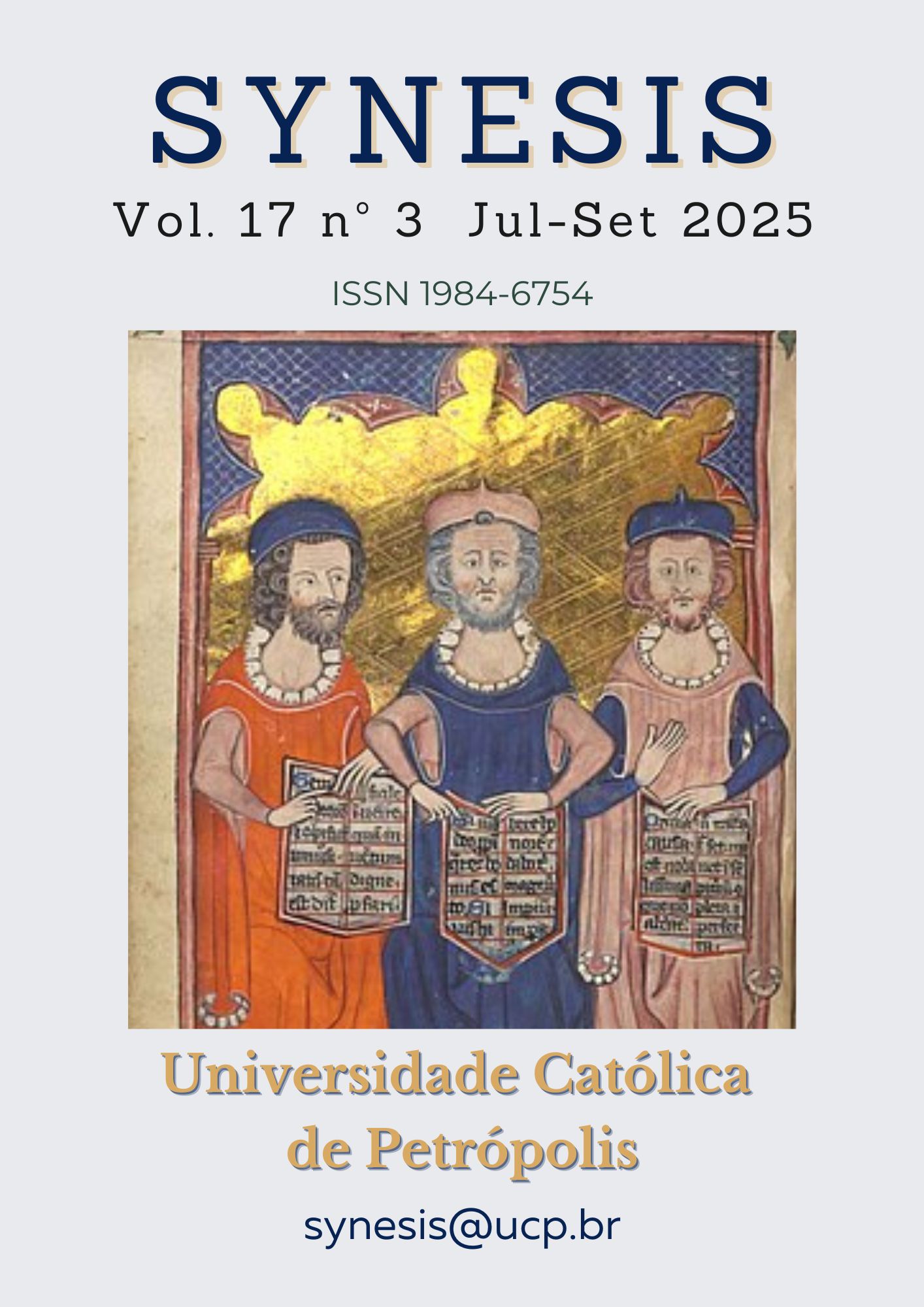Resumo
O pensamento Yin-Yang (陰陽) constitui o fundamento filosófico básico da cosmologia oriental, especialmente no sistema de pensamento taoísta. Segundo o taoismo, o Tao é a entidade suprema (o supremo absoluto), do qual nascem o yin e o yang como duas forças opostas que operam e se transformam para gerar todas as coisas. Esse pensamento não se limita ao campo da teoria filosófica, mas também permeia profundamente muitos aspectos da vida cultural vietnamita, em especial o culto aos antepassados. Este artigo se concentra em analisar a relação entre a doutrina do Yin-Yang (陰陽) no taoismo e as manifestações culturais e rituais no culto aos antepassados dos vietnamitas. Por meio do levantamento de espaços de culto, rituais de aniversário de morte, disposição das oferendas e símbolos de adoração, o artigo mostra que a estrutura Yin-Yang (陰陽) não é apenas um símbolo, mas também um princípio de organização da vida espiritual, moral e social. Essa ideologia contribui para a formação de uma visão de mundo harmoniosa, cíclica e contínua entre os seres humanos, os antepassados e o universo. Com uma abordagem interdisciplinar que combina filosofia, antropologia cultural e pesquisa de rituais populares, o artigo oferece uma visão sistemática e atualizada sobre o papel da teoria Yin-Yang (陰陽) na preservação e adaptação da cultura tradicional vietnamita no contexto moderno.
Referências
Ames, Roger T., & Hall, David L. (2003). Dao De Jing: A Philosophical Translation. Ballantine Books.
An, P. (2010), Vietnamese folk beliefs. Hanoi: Social Sciences.
Anh, D. D. (1930). Vietnam’s cultural history. Hue: Quan Hai Tung Thu.
Anh, N. V. T. (2010). Lac Viet civilization - Historical origin of the theory of Yin - Yang (陰陽) and Five Elements and the Book of Changes. Center for Oriental Philosophy Research. https://fos.ussh.vnu.edu.vn/vi/news/tan-man-phuong-dong/van-minh-lac-viet-coi-nguon-lich-su-cua-thuyet-am-duong-ngu-hanh-va-kinh-dich-389.html
Baldrian Hussein, F. (2002). Taoism and Chinese Religion. Stanford University Press.
Chau, N. T. H. (2024). Ancestor Worship in Contemporary Vietnam: A Study of Filial Piety. The International Journal of Religion and Spirituality in Society 15 (2): 113-137. doi:10.18848/2154-8633/CGP/v15i02/113-137
C. Korea. (2024). Yin and Yang Philosophy in Korean Culture. Retrieved from https://c-korea.vn/triet-ly-am-duong-trong-van-hoa-han-quoc/?lang=en
Duong, N. H. (2001). Religion and beliefs in Vietnam today. Hanoi: Religion.
Giau, T. V. (1983). Philosophy and Ideology. Vietnam: Ho Chi Minh City.
Graham, Angus (1981). Chuang-Tzu: The Inner Chapters. Hackett Publishing.
Hansen, Chad (1992). A Daoist Theory of Chinese Thought: A Philosophical Interpretation. Oxford University Press.
Hinh, N. D. (1996). Traditional beliefs of Vietnamese people. Hanoi: Ethnic Culture.
Hinh, N. D. (1999). Chinese Taoism: past and present. Chinese Studies, (1), pp. 45-47.
Hu Fushen. (editor - 1995). Chinese Taoist Encyclopedia. Social Sciences Publishing House (China - Beijing).
Huy, N. V. (2005). Intangible cultural heritage of the Vietnamese people. Hanoi: Culture and Information.
Huy, C. X. (1995). Eastern thought suggests reference points. Hanoi: Literature.
Jang, Y.-S. (2025). A Study on the Correlation of the Yin and Yang Five Elements of Korea’s Five Pure Colors and Body Words. International Journal of Advanced Culture Technology, 13(1), 307–311. https://doi.org/10.17703/IJACT.2025.13.1.307
Khanh, V. N. (2001). Vietnamese folk beliefs. Hanoi: National Culture.
Kohn, Livia (1992). Early Chinese Mysticism: Philosophy and Soteriology in the Taoist Tradition. Princeton University Press.
Kohn, Livia (2001). Daoism and Chinese Culture. Three Pines Press.
Lan, P. H. (Translator, Nguyen Huu Ai, 1977). History of Chinese philosophy. Philosophy library.
Lao Tzu (translator: Nguyen Hien Le, 2003). Dao De Jing. Literature Publishing House.
Long, N. T., et al.. (2019). Identify the values of ancestral worship belief in the spiritual life of Vietnamese people. International Journal of Philosophy, 7(4), pp. 60-66. https://doi.org/10.Ha,2001648/j.ijp.20190704.14
Maspero, Henri (1971). Le Taoïsme et les religions chinoises. Gallimard.
Mair, Victor H. (1994). Wandering on the Way: Early Taoist Tales and Parables of Chuang Tzu. University of Hawaii Press.
Ngoc, P. (2002). Vietnam’s cultural identity. Hanoi: Literature.
Hong Nie & Sibo Yang. (2017). The Influence of the Philosophical Concept of Yin and Yang on the Modeling of Folk Patterns. Advances in Social Science, Education and Humanities Research, volume 142. Retrieved from file:///C:/Users/Vip/Downloads/25886348.pdf
Zheng Siyou & Chen Xiaoqin. (1990). Chinese Fairy Tales. Shanghai Literature Publishing House.
Zhuāng Zǐ. (translator: Nguyen Duy Can, 2002). Trang Tu ( 南华经-Nan Hua Jing). Vietnam: Ho Chi Minh City.
Quoc, L. T. (2017). Vietnamese spiritual culture. Hanoi: Culture - Information.
Ren Jiyu. (editor - 1963). History of Chinese Philosophy. Beijing Publishing House.
Them, T. N. (2000). Vietnamese cultural foundations. Hanoi: Education
Thuy, D. L. (2014). Symbols and culture. Hanoi: Culture and Information.
Thuy, D. L. (2009). Vietnamese consciousness seen from cultural symbols. Hanoi: Knowledge.
Tony Fan. (2011). Yin Yang: A New Perspective on Culture. Management and Organization Review, 8(1), pp. 25-50. https://doi.org/10.1111/j.1740-8784.2011.00221.x
Trung, N. S., & Van, V. H. (2020). Vietnamese Cultural Identity in the Process of International Integration. Journal of Advances in Education and Philosophy 4(6), pp. 220-225
Van, D. N. (2005). Theory of religion and religious situation in Vietnam. Hanoi: National politics.
Van, V. H. (2022). The influence of Taoism on the folk beliefs of the Vietnamese. The Russian Journal of Vietnamese Studies 6(4), pp. 51-60. DOI: https://doi.org/10.54631/VS.2022.64-111099
Van, V. H. (2023). Vietnamese People’s Customs of Worshiping the Soul: Concept, Content and Current Changes. The Russian Journal of Vietnamese Studies 7(3-2). pp. 67-77. DOI: https://doi.org/10.54631/VS.2023.732-123534
Van, V. H. . (2023). Values and Limitations of Lao Tzu’s Dialectic Ideology in The World. Synesis, 15 (1), 366–381. Retrieved from https://seer.ucp.br/seer/index.php/synesis/article/view/2669
Van, V. H. (2025). Wu Wei’s Taoist Thought - Action Through Non-Action and Its Influence in Vietnam. Synesis (ISSN 1984-6754), 17 (2), 55-71. Retrieved from https://seer.ucp.br/seer/index.php/synesis/article/view/3356
Van Vo, D., & Xuan Cao, L. (2022). The “Yin” and “Yang” Ancient Chinese Philosophy and its Practical Application to Body Treatment. WISDOM, 24(4), 227–234. https://doi.org/10.24234/wisdom.v24i4.948
Vuong, T. Q. (1998). Vietnamese culture Research and contemplation. Hanoi: Ethnic Culture.
Williams, J. (2020) Yin-yang in Japan: harmonising vital energies. A blog on the symbolism of yin-yang in Japan. https://elementaljapan.com/2020/04/27/yinyang-in-japan-harmonising-vital-energies/

Este trabalho está licenciado sob uma licença Creative Commons Attribution-NonCommercial-NoDerivatives 4.0 International License.
Copyright (c) 2025 Synesis (ISSN 1984-6754)

